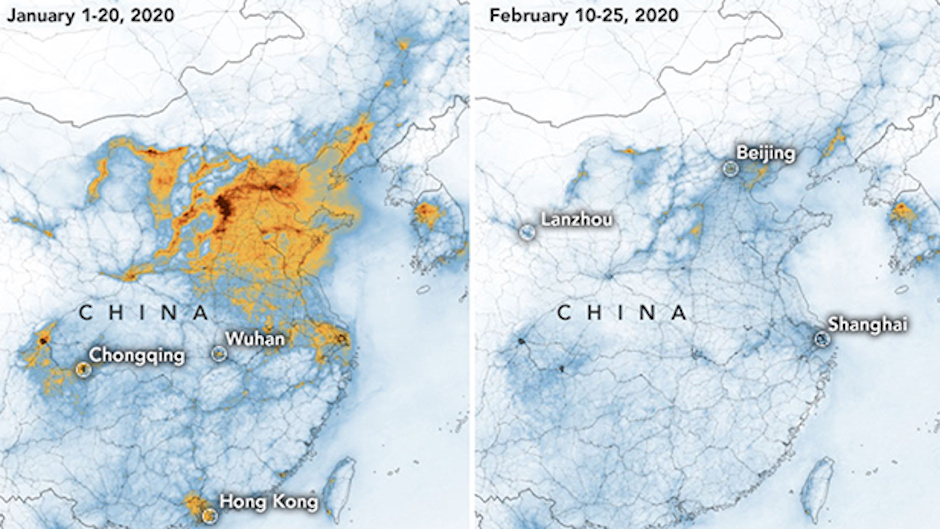Now there appears to be undeniable proof that it can be done—greenhouse gas emissions, which are superheating the planet, can be reduced considerably by curtailing our dependency on fossil-fuel-burning vehicles.
Over the course of just a few days, data from NASA and European Space Agency satellites have proved it.
What is regrettable, though, is that such validation has been spurred by a pandemic that has crossed oceans, killing tens of thousands of people, pushing the world’s economies to the brink of collapse, and straining health care systems beyond their capabilities.
In their efforts to halt the unimpeded march of the novel coronavirus, COVID-19, governments have imposed travel restrictions, issued stay-at-home orders, and, in extreme cases, instituted total lockdowns—all of which have reduced the number of cars on the roads and planes in the sky. In turn, atmospheric levels of nitrogen dioxide, which comes primarily from vehicle exhaust, have plummeted in countries around the world—from China to Italy to the United States.
The pandemic’s unintended climate benefits, fleeting though they may be, have offered lessons on potential future actions that can be taken to keep temperatures in check and a climate catastrophe from occurring.
“It has been hard to achieve meaningful results in climate change policy because people have been reluctant to change their lifestyles. The steps needed were just too hard and too disruptive on our economy,” said Professor of Law Jessica Owley, who specializes in environmental law with a focus on climate change law and policy.
“What we are learning now is that we can make changes when we need to,” Owley said. “Climate change is going to be even more devastating than this pandemic in terms of public health and impacts on our economy. Maybe the changes that we have made now without having a chance to even plan for them will help people see that we can all come together and make necessary sacrifices.”
The creative measures being implemented by municipalities and businesses to help stop the spread of COVID-19, such as work-from-home policies and cloud-based video conference meetings, could endure long after the pandemic ends, some experts believe.
“People are putting a lot of time, energy, and resources into figuring out how to telecommute,” Owley explained. “We will learn that several functions can work well online. Municipalities should take advantage of the programs and equipment they are currently investing in and facilitate changes in public offices and services. I think we will see more telecommuting and perhaps changes in schedules.”
Owley, who attended the United Nations COP25 climate change conference in Madrid last December with six students from her U.N. Negotiations class, said the initial responses to the coronavirus crisis mirror, in some respects, our reactions to climate change.
“From world leaders to our neighbors, and perhaps even ourselves, we saw a denial that the pandemic was really as serious as people were saying,” she said. “We felt healthy, we went to the dinner parties, we flew to conferences. The changes we were being told were needed just felt so hard and unpleasant that we avoided them. People wouldn’t stay out of the bars when public health officials advised them to stay home. It took the government closing the bars for that to happen.”
At COP25, delegates were unable to agree on how to move forward with the mechanics of the Paris Agreement. But in the wake of the coronavirus crisis, that could change at the next summit. “Now,” said Owley, “we have been given some idea of how to mobilize on big issues. We have also seen firsthand that disasters come whether you prepare or not, and a lack of preparation can exacerbate the problem."
More on Environmental Law at Miami Law

